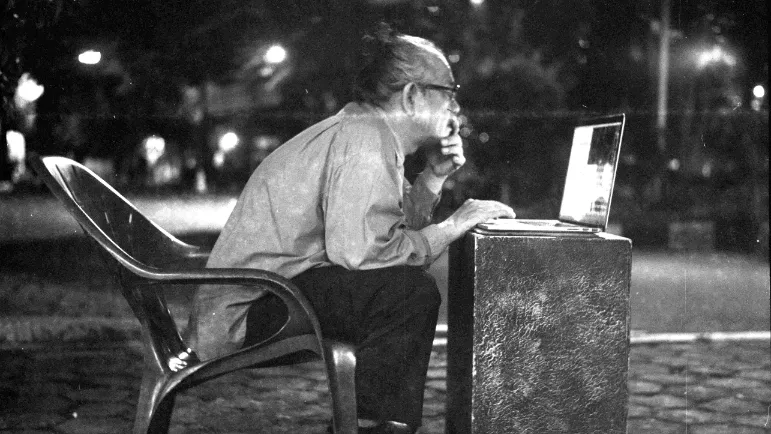The Unconditional Benefits Of Poetry
When it comes to ways in which we can all connect with each other, my personal favourite is and will always be the way of poetry.
In an article from the New York Times, Salvatore Quasimodo said: “Poetry … is the revelation of a feeling that the poet believes to be interior and personal which the reader recognizes as his own.” Poetry is a form of art that allows a person to feel less isolated and creates a sense of togetherness within the community.
As per the knowledge of several therapists, we understand that writing and reading poetry is therapeutic and allows for growth and healing. Furthermore, it not only makes way for transformation but also allows the imagination to soar higher, opening up our psyche and allowing us to determine one’s personality while simultaneously giving us insight into their traumas and behaviour.
Through poetry, we can develop self-realization and we can use writing as a form of meditation where we tap into our conscious minds. A poetry therapist, John Fox assists people with finding their poetic voices and using it as a form of therapy or healing. He does so by asking people vital questions that they can use as writing prompts, for example: “What scares you?”
To further prove the importance of poetry, there are several physicians who were able to discover the depths of a person’s psyche on the basis of them being poets as well. These include John Keats, Anton Chekhov and William Carlos Williams. Poetry makes room for self-monitoring and allows for improved thinking skills.
Poetry also allows for a more vibrant sense of empathy and compassion while simultaneously developing our leadership skills. Through the process of finding the meter of a poem to learning new vocabulary, poetry increases cognitive functions. Sidney Harmon had once told the New York Times that she hires poets as managers because “Poets are our original systems thinkers.
They look at our most complex environments and they reduce the complexity to something they begin to understand.” This points out how writing poetry can allow one to easily simplify complex issues, be it personal or part of the community. Dana Gioia also says that writing poetry encourages qualitative skills and creative judgement, both of which are needed within senior executives.
As a poet, I can personally vouch for the several benefits of it. Furthermore, I gather inspiration from a myriad of Muslim poets such as Hassan ibn Thabit (r.a.) who was a Sahabah and poet of the Arabic language. After settling in Medina and accepting Islam at the age of sixty, Hassan ibn Thabit (r.a.) had become best known for his poetry in which he defended the prophet Muhammed (S.A.W.)
His writing also referenced a plethora of contemporary events that had been used to document that period of time, proving the further benefits of poetry even in Islamic history. He had often used Quranic verses in his poetry and is said to be Islam’s first religious poet. He was referred to as “the prophet’s poet.”
One of the most popular Muslim poets of all times is Jalāl ad-Dīn Muhammad Balkhī or more commonly known as Rumi. Popular amongst Muslims and non-Muslims, Rumi speaks of spirituality and love in ways that ignite a sense of understanding within us.
A quote of his echoes in comfort: “The wound is the place where the Light enters you.” There are often times when we see people turn to Rumi’s poetry in moments of despair. His words offer a sort of serenity and help in calming one down. His poetry has been devoured since the thirteenth century and continues to be loved even during the twenty-first century. More so because of the way in which he portrays the importance of every human experience, be it good or bad.
Rumi also significantly helped keep many people sane and in faith. He said: “When the world pushes you to your knees, you’re in the perfect position to pray.” Through these words, and many more like this, Rumi vividly emphasizes the vitality of prayer and belief. One of my favourite quotes of his that accurately relates to this topic is: “Let yourself become living poetry.”
Another celebrated poet includes Muhammed Iqbal (More commonly known as Allama Iqbal) who was given the title of “The spiritual father of Pakistan” and was given the honour of being Pakistan’s national poet.
Once again putting emphasis on poetry and its significance, Allama Iqbal said: “Nations are born in the hearts of poets.” In support of strength and failure, Allama Iqbal’s famous quote says: “Failure is not fatal until we surrender trying again is the key of glorious victory.” Mirza Asadullah Baig Khan, who we know by the name of Ghalib has been another prominent poet.
It is through poetry that we learn to see the depths of life and ourselves. What one writes is a reflection of what one desires or what one feels on an unconscious level. Just like the Arabs had been fond of poetry and the Sufi mystics had been enveloped in the abyss of words, to this day we see millions of people connecting with poetry in a way that makes us feel a little less lonely in today’s world.
During this global pandemic, while we pray and await a moment of peace, we can also use writing as a way to let go of reality and open up our imagination for a while. We can use it as a form of protest, meditation and just to unwind the stress we go through on a daily basis.
Try one of these poetry exercises whenever you have a moment to spare.
About The Author
Bio: Muskaan Ayesha is a South African author, poet, editor and radio presenter. She’s a strong willed woman with a love for trying new things and living life through all her gathered knowledge.


